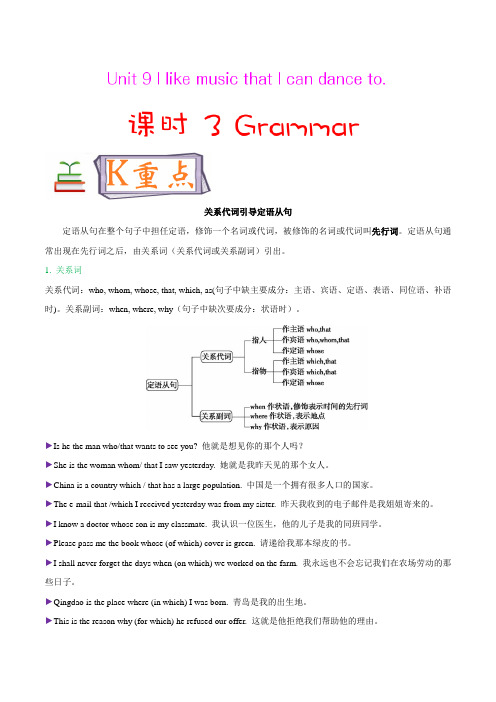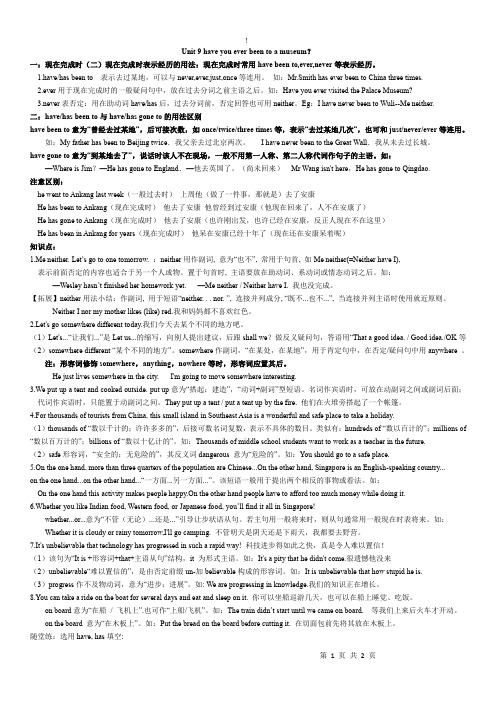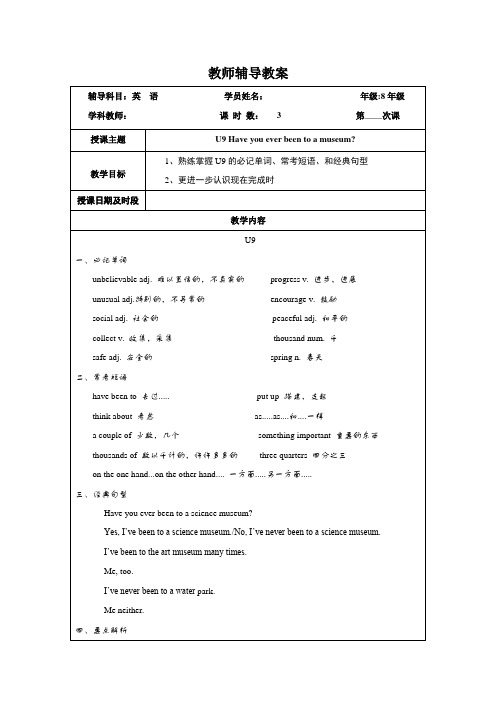Unit 9 讲义习题答案
Unit 9 第3课时Grammar--九年级英语人教版培优讲义含答案

关系代词引导定语从句定语从句在整个句子中担任定语,修饰一个名词或代词,被修饰的名词或代词叫先行词。
定语从句通常出现在先行词之后,由关系词(关系代词或关系副词)引出。
1. 关系词关系代词:who, whom, whose, that, which, as(句子中缺主要成分:主语、宾语、定语、表语、同位语、补语时)。
关系副词:when, where, why(句子中缺次要成分:状语时)。
►Is he the man who/that wants to see you? 他就是想见你的那个人吗?►She is the woman whom/ that I saw yesterday. 她就是我昨天见的那个女人。
►China is a country which / that has a large population. 中国是一个拥有很多人口的国家。
►The e-mail that /which I received yesterday was from my sister. 昨天我收到的电子邮件是我姐姐寄来的。
►I know a doctor whose son is my classmate. 我认识一位医生,他的儿子是我的同班同学。
►Please pass me the book whose (of which) cover is green. 请递给我那本绿皮的书。
►I shall never forget the days when (on which) we worked on the farm. 我永远也不会忘记我们在农场劳动的那些日子。
►Qingdao is the place where (in which) I was born. 青岛是我的出生地。
►This is the reason why (for which) he refused our offer. 这就是他拒绝我们帮助他的理由。
人教版英语八下单元9习题+讲义

Unit 9 have you ever been to a museum?一:现在完成时(二)现在完成时表示经历的用法:现在完成时常用have been to,ever,never等表示经历。
1.have/has been to 表示去过某地,可以与never,ever,just,once等连用。
如:Mr.Smith has ever been to China three times.2.ever用于现在完成时的一般疑问句中,放在过去分词之前主语之后。
如:Have you ever visited the Palace Museum?3.never表否定:用在助动词have/has后,过去分词前,否定回答也可用neither。
Eg:I have never been to Wuli--Me neither.二:have/has been to与have/has gone to的用法区别have been to意为“曾经去过某地”,后可接次数,如once/twice/three times等,表示“去过某地几次”,也可和just/never/ever等连用。
如:My father has been to Beijing twice.我父亲去过北京两次。
I have never been to the Great Wall.我从未去过长城。
have gone to意为“到某地去了”,说话时该人不在现场,一般不用第一人称、第二人称代词作句子的主语。
如:—Where is Jim?—He has gone to England.—他去英国了。
(尚未回来)Mr Wang isn't here,He has gone to Qingdao.注意区别:he went to Ankang last week(一般过去时)上周他(做了一件事,那就是)去了安康He has been to Ankang(现在完成时)他去了安康他曾经到过安康(他现在回来了,人不在安康了)He has gone to Ankang(现在完成时)他去了安康(也许刚出发,也许已经在安康,反正人现在不在这里)He has been in Ankang for years(现在完成时)他呆在安康已经十年了(现在还在安康呆着呢)知识点:1.Me neither. Let’s go to one tomorrow. :neither用作副词, 意为“也不”, 常用于句首, 如Me neither(=Neither have I),表示前面否定的内容也适合于另一个人或物。
人教版七年级上英语·Unit9讲义与练习含答案

⼈教版七年级上英语·Unit9讲义与练习含答案七年级上英语讲义Unit 9My favorite subject is science.学⽣姓名就读学校时间本章的知识清单知识框架表短语集萃1.sb. favorite subject/sport/fruit/teacher… 某⼈最喜欢的科⽬/运动/⽔果/⽼师…2. play games 做游戏3. on Monday/ Tuesday… 在星期⼀/ 星期⼆…4. from… to… 从…到…5. an art lessons for two hours ⼀节两⼩时的美术课6. have math/ history 上数学课/ 历史课7. play with… 和…玩耍8. want to do sth. 想做某事9. on Friday afternoon 在星期五下午句型汇总1. ---What’s your favorite subject? 你最喜欢的科⽬是什么啊?---My favorite subject is science.我最喜欢的科⽬是科学。
2. How’s your day? 你今天过得如何?3. Who’s your P.E. teacher? 你的体育⽼师是谁?4. That’s for sure. 的确如此。
5. ---Why does Bob like history? 鲍勃为什么喜欢历史?---Because it’s interesting. 因为它有趣。
6. ---When is your geography class? 你们的地理课是什么时候?---It’s on Monday and Friday. 它在星期⼀和星期五。
7. Is that OK with you? 那对你来说合适吗?语法全解——特殊疑问句1. 特殊疑问句的含义及构成:特殊疑问句是以疑问代词或疑问副词开头,对句⼦中的某⼀部分进⾏提问的句⼦。
2019人教版英语八年级下册Unit9讲义习题精品教育.doc

Unit 9Have you ever been to a museum?课文重难点解说:此刻达成时一.观点:此刻达成时(Present Perfect Tense)过去发生并且已经达成的动作对此刻造成影响或结果,也能够表示过去某一时间开始并向来连续到此刻的动作或状态。
二 . 时间状语:1. just, already, yet, ever, recently, before, twice, three times, so far, up to now, till now2. since+(过去时间 ) 时间点 , since +一段时间 + ago,与since +从句(从句用一般过去时)since yesterday, since last week, since last spring, since 1949, since half an hour ago,since I became a teacher3.for+ 一时间段 for an hour, for two days, for three weeks ,for four months, for five years4.in the last few hours, in the last few days, in the last few years三.谓语组成:have/has + 过去分词四.用法说明: 1.表示过去某个时间发生的动作对此刻的影响或结果,常与just, already, yet, recently, before, twice, three times 等时间状语连用,如:I have seen the film already.我已经看过那部电影了。
(此刻我知道电影的内容了。
)Have you seen my bag? 你看到我的手提包了吗? (你知道它在哪里? )2.表示过去发生的动作向来连续到此刻,并且有可能连续连续下去,常与“ since+时间点”,“ for+一时间段”,及 how long, (ever) since, ever, before, so far, in the last/ past few years, up to now, till now等时间状语连用。
2020年新目标人教版八年级下册 Unit 9讲义设计(有答案)

A. is there B.isn’t there C. isn’t it
(4) It’sunbelievablethat technology hasprogressedinsucharapidway!
拓展:progress用作不可数名词,意为“进步”。常用短语make progress (in...)意为“在....方面取得进步”。
Eg: You have made progress in your English.
3.辨析:such与so
二者都表示程度,意为“如此,这样”,其区别如下
A.such形容词such+a/an+形容词+可数名词单数
C. it用于指代前面提到过的名词,即同名同物。
Eg: Do you like the game? -----Yes, I like it.
中考链接:The banana pie tastes delicious. Could I have another ___A______?
A. one B. it C. this D. that
the future.
解析:1. encourage及物动词,意为“鼓励”,常用结构为encourage sb to do sth,意为“鼓励某人做某事”。
Eg: Parents should encourage children to do things by themselves.
中考链接:Our English teacher encourages us ___A___part in all kinds of after-class activities.
2021年自考英语二教材课文讲义unit9

2021年自考英语二教材课文讲义unit9 Unit 9 Facing Life’s ChallengesI. New words and expressionsNew words1. hurdle n. hurdles [pl.]跨栏赛;栏架,跨栏;难关,障碍2. negative n. 否定词;否定;拒绝 adj. 坏的;有害的3. despair v. 绝望;失去希望;丧失信心4. petty adj. 小的:琐碎的;次要的5. individual adj. 一个人的;供一个人用的6. lane n. (比赛的)跑道,泳道7. spot n. 地点;场所;处所8. symbolize v. 象征;是…的象征;代表 symbol-ize常用的动词后缀:modernize, globalize, economize 9. incredibly adv. 极端地;极其 credible 可靠的,可信的 credibly变副词时需省略-e的形容词有simple, true, credible, believable simply, truly, (in)credibly, (un)believably 10. positive adj. 良好的;正面的 11. tough adj. 艰苦的;艰难的;棘手的 12. arise v. 发生;产生;出现 arise from sth. 区分:arouse / arisearouse one's anger / respect / sympathy 13. lost adj. 不知所措的;一筹莫展的 14. leap v. 跳跃 15. yard n. 码 16. inch n. 英寸17. cinch n. 很容易的事;小莱Phrases and Expressions1. line up 排成一行;站队;排队(等侯)2. end up 最终成为;最后处于end up (in) doing sth. end up begging / being arrested end up as a beggar / prisoner / millionaireend up in prison / debts3. keep up with (与…)齐步前进;并驾齐驱;跟上4. pace oneself 调整自己的工作(或活动)节奏5. fit in (与…)合得来;适应6. get over 解决;克服;控制7. wear out 使疲乏;使筋疲力尽;使厌烦 8. with ease 轻而易举地 9. make it 获得成功10. fall over 被…绊倒;几乎被…绊倒 11. get lost 不知所措;一筹莫展12. look back on 回首(往事);回忆;回顾 13. inch by inch 缓慢而谨慎地;一步一步 14. at a time 每次;逐一;依次II. Text Learning300 Hurdles① Life may giv e you a negative, but don't despair - it may just develop into a beautiful picture one day. This year, I realized my theory that I have on life. Life is like a 300m hurdle race. Since I run the 300m hurdles, I would know what the race is like.② The fi rst thing to any race is worrying about whether you are going to win or not. This relates to worrying about the petty things in life. Does it really matter if you win? Is it really going to be the end of the world? Or will you be upset if you lose and then forget about it? (1)In life we worry too much and live in the moment too little. (承上总结句)③ (2)Next is the lining up in our own individual lanes. We each start at different spots, but the race is still the same distance for everyone.(承上启下句) (3)This relates to our lives taking us to different places and putting us in different situations, but hopefully we will end up in the same place, but maybe at different times.④ Now comes the beginning of the race. We all try to keep up with everyone and pace ourselves with other people. (4)This symbolizes that at times in everyone's lives we worry, about fitting in or being the same as other people, instead of worrying about being unique. If everyone were the same, the world would be incredibly boring. 本部分重点及难点:1. In life we worry too much and live in the moment too little. 生活中,我们担心得太多,而活在当下太少。
Unit9It'sonehundred.知识点讲解精选精练(讲义)湘少版英语四年级上册
Unit 9知识点讲解一、核心词汇★★★1.数词及短语: one hundred一百fortysix四十六fiftyfour五十四twenty 二十thirty三十forty 四十fifty 五十sixty 六十seventy 七十eighty 八十ninety九十2.形容词: right 正确的wrong 错误的3.其他: homework家庭作业二、了解词汇★★spell拼写sum 总数cute 可爱的三、核心句型★★★Forty six and fiftyfour is… 四十六加五十四等于……解读:这是一个表达数学加法运算的句子。
举一反三: Twentytwo and fortyfive is sixtyseven. 二十二加四十五等于六十七。
四、了解句型★★1. It's one hundred. 是一百。
解读: 这是描述数字的句型。
举一反三: It's forty. 是四十。
2. I can count in English from1 to 100. 我能用英语从一数到一百。
解读: 这是表达某人能做某事的句型。
举一反三: I can speak English.我会说英语。
精选精练一、单选题1.It’s one _______ (百). ()A.hundred B.handred2.What are ____ names? ()A.they B.them C.their 3.Three and four is ______. ()A.seven B.eight C.nine D.six 4.Twentytwo and seventyeight is ________. ()A.hundred B.one hundred C.hundreds 5.—How many rulers are there? ( )—_____________.A.Ten rulers.B.Ninety rulers.C.One hundred rulers.6.—How do you spell “Dino”? ()—_______.A.I’m Dino.B.Dino is cute.C.D—I—N—O. 7.Twelve and ______ is one hundred. ()A.ninetyeight B.eighty C.eightyeight 8.fifty ()A.15B.50C.5D.25 9.—How do you spell “mouse”? ()—____________.A.It's small B.No, I don't C.MOUSE 二、词汇选择题找出各组中不同类的一项。
沪教版五年级上册英语Unit9 Around the city讲义
Unit 9 Around the city一、基本知识点(一)词汇:post office [ˈpəust ɔfis]quite [kwaɪt]along [ə'lɒŋ]turn [tɜːn]left [left]right [raɪt]between [bɪ'twiːn]flower shop ['flaʊəʃɒp]hospital ['hɒspɪt(ə)l]toy shop [tɔɪʃɑp](二)短语:get to 到达walk along 沿着…走turn left/right 向左拐/向右拐on your left/right 在你左边/在你右边between…and…在…和…之间walk straight 直着往前走look at 看get there 到达那里want to do 想干某事be far from 离…远excuse me! 打扰了(三)句型:1. Walk along Winter Street. 沿着冬天街走。
2. Turn left at Spring Street. 在春天街向左拐。
3. It’s between the cinema and the flower shop. 它在电影院和花店之间。
4. Walk straight and you can see the post office on your right.直着往前走,邮局就在你的右手边。
5. Thank you very much. 非常感谢。
You are welcome. 不客气。
(四)重难点、易错点:1. 现在进行时be+doing 二者缺一不可2. 一般现在时---单三(wants)3. 写作:学会如何帮助别人指路Walk along ____________ . Turn right at _____________. It’s between __________and___________.二、典型例题1. Ben goes to Zhongshan Park _________underground.A. ofB. inC. by【解析】答案:C 根据句意:乘交通工具用by2. Look, the children ________ the sunshine.A. are enjoyingB. enjoyingC. enjoys【解析】答案:A 根据句意:看,孩子们正在享受阳光。
人教版英语初三UNIT9讲义+习题
2. Is this the factory __________ you visited the other day?A. thatB. whereC. in whichD. the one3. Is this factory __________ some foreign friends visited last Friday?A. thatB. whereC. whichD. the one4. Is this the factory __________ he worked ten years ago?A. thatB. whereC. whichD. the one5. The wolves hid themselves in the places __________ couldn’t be found.A. thatB. whereC. in whichD. in that6. The freezing point is the temperature __________ water changes into ice.A. at whichB. on thatC. in whichD. of what7. This book will show you __________ can be used in other contexts..A. how you have observedB. what you have observedC. that you have observedD. how that you have observed8. The reason is __________ he is unable to operate the machine.A. becauseB. whyC. thatD. whether9. I’ll tell you __________ he told me last week.A. all whichB. thatC. all thatD. which10. That tree, __________ branches are almost bare, is very old.A. whoseB. of whichC. in whichD. on which11. I have bought the same dress __________ she is wearing.A. asB. thatC. whichD. what12. He failed in the examination, __________ made his father very angry.A. whichB. itC. thatD. what13. We’re talking about the piano and the pianist __________ were in the concert we attended last night.A. whichB. whomC. whoD. that14. The girl __________ an English song in the next room is Tom’s sister.A. who is singingB. is singingC. sangD. was singing15. Those __________ not only from books but also through practice will succeed.A. learnB. whoC. that learnsD. who learn16. Anyone __________ this opinion may speak out.A. that againstB. that againstC. who is againstD. who are against17. Didn’t you see the man __________?A. I nodded just nowB. whom I nodded just nowC. I nodded to him just nowD. I nodded to just now18. Can you lend me the novel __________ the other day?A. that you talkedB. you talked about itC. which you talked withD. you talked about19. Is there anything __________ to you?A. that is belongedB. that belongsC. that belongD. which belongs20. ---- “How do you like the book?”---- “It’s quite different from __________ I read last month.”A. thatB. whichC. the oneD. the one what21. Mr. Zhang gave the textbook to all the pupils except __________ who had already taken them.A. the onesB. onesC. someD. the others22. The train __________ she was travelling was late.A. whichB. whereC. on whichD. in that23. He has lost the key to the drawer __________ the papers are kept.A. whereB. in whichC. under whichD. which24. Antarctic __________ we know very little is covered with thick ice all the year round.A. whichB. whereC. thatD. about which25. It’s the third time __________ late this month.A. that you arrivedB. when you arrivedC. that you’ve arrivedD. when you’ve arrived26. It was in 1969 __________ the American astronaut succeeded in landing on the moon.A. thatB. whichC. whenD. in which27. May the fourth is the day __________ we Chinese people will never forget.A. whichB. whenC. on whichD. about which28. We are going to spend the Spring Festival in Guangzhou, __________ live my grandparents and some relatives.A. whichB. thatC. whoD. where29. The hotel __________ during our holidays stands by the seaside.A. we stayed atB. where we stayed atC. we stayedD. in that we stayed30. Is it in that factory __________ “Red Flag” cars are produced?A. in whichB. whereC. whichD. that31. It is the Suez Canal __________ separates Asia __________ Africa.A. which, toB. where, fromC. that, fromD. that, with32. Under the bridge, however, almost directly below, __________ was a small canoe, with a boy in it.A. thereB. whereC. itD. which33. He is not __________ a fool __________.A. such, as he is lookedB. such, as he looksC. as, as he is lookedD. so, as he looks34. Is that the reason __________ you are in favour of the proposal?A. whichB. whatC. whyD. for that35. He must be from Africa, __________ can be seen from his skin.A. thatB. asC. whoD. what36. He has two sons, __________ work as chemists.A. two of whomB. both of whomC. both of whichD. all of whom37. I, __________ your good friend, will try my best to help you out.A. who isB. who amC. that isD. what is38. He is a man of great experience, __________ much can be learned.A. whoB. thatC. from whichD. from whom39. ---- Do you know the town at all?--- No, this is the first time I __________ here.A. wasB. have beenC. cameD. am coming40. I don’t like __________ you speak to her.A. the wayB. the way in thatC. the way whichD. the way of which41. The two things __________ they felt ver y proud are Jim’s gold watch and Della’s hair.A. about whichB. of whichC. in whichD. for which42. The dinner was the most expensive meal we __________.A. would haveB. have hadC. had never hadD. had ever had43. Do you know which hotel __________?A. she is stayingB. she is staying inC. is she stayingD. is she staying in44. There is only one thing __________ I can do.A. whatB. that C . all D. which45. Who can think of a situation __________ this idiom can be used?A. whichB. thatC. whereD. in that46. I have many books, some of __________ are on chemistry.A. themB. thatC. WhichD. those47. They were interested __________ you told them.A. in whichB. in thatC. all thatD. in everything48. The astronaut did many experiments in the spaceship, __________ much help for knowing space.A. which we think it isB. which we think are ofC. of which we think isD. I think which is of49. The great day we looked forward to __________ at last.A. comeB. cameC. comingD. comes50. I like the second football match __________ was held last week.A. whichB. whoC. thatD. /6..mind doing7.provide sb. With sth.=provide sth for sb=offer sb sth=offer sth to sb关系代词的用法1. that 既可以用于指人,也可以用于指物。
人教版七年级英语下册Unit 9 What does he look like讲义设计练习(含答案)
第1讲 Unit 9 What does he look like 语法题+句型语法题一:句型转换My brother is a little fat. (对画线部分提问)_______ _______ your brother ______ ______?小结(询问某人外表)询问某人外表:What do/does 主语look like?注意:like为介词,是“像”的意思。
题二:完成句子My English teacher _____________________ (中等身高).小结(描述人外表的陈述句)描述人的外表:●主语+be+adj. (tall, fat, thin…)●主语+be+of +n. (medium height/build)题三:完成句子My sister_____________________ (留着长长的卷发).题四:完成句子Lily ______________________(穿着红色短裙,戴着一顶帽子).小结(描述人的外表)描述人的外表:主语+have(长着)/wear(穿着/戴着)题五:完成句子The girl _______________ (长着棕色头发) is my friend.小结(with的复合结构)小结难点:放在某人后修饰这个人的外观或着装,并且句子不缺谓语的时候,译为“长着,穿着,戴着……”用介词with…的这种结构。
题六:句型转换My brother likes playing football.(对画线部分提问)________ _______ your brother ________ doing?小结(询问某人喜好)小结●难点:like:v. 喜欢●询问某人喜好:What do/does 主语like?题七:句型转换Lucy is very kind and outgoing. (对画线部分提问)_______ _______ Lucy _______?小结(询问性格)●难点:be like(like为介词)表示某人或某物的特征●询问性格:What be +主语+like?句型题八:用括号中所给词的适当形式填空。
- 1、下载文档前请自行甄别文档内容的完整性,平台不提供额外的编辑、内容补充、找答案等附加服务。
- 2、"仅部分预览"的文档,不可在线预览部分如存在完整性等问题,可反馈申请退款(可完整预览的文档不适用该条件!)。
- 3、如文档侵犯您的权益,请联系客服反馈,我们会尽快为您处理(人工客服工作时间:9:00-18:30)。
暑期 Level 5 - Unit 9 讲义习题答案
一、According to the sentences, fill in blanks with the correct forms of the words.
用所给词的适当形式填空
1.I want some paper to write on.
2.Linda was made to work 难度系数
3.When the teacher came in, all the students stopped talking (talk).
4.He found it easy to learn (learn) English well.
5.My father is busy cooking (cook) in the kitchen.
6.Mother asks me not to play (not play) computer games before dinner.
二、Underline one mistake in each sentence and correct it.
划出句中的一个错误,并改正
1.I have decided studying English.
改成: to study
2.Peter is good at swim.
改成:swimming
3.A lot of people like Mr. Bean very much because he often makes them to laugh.
改成:laugh
4.Parents always tell us drinking more water.
改成:to drink
5.Let him having a rest. I think he must be tired after a long trip.
改成:have
6.The lights in the room are still on. I forgot turning them off.
改成:to turn 难度系数
Reading: CADAB。
